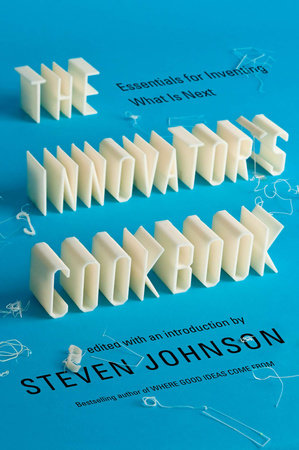Table of Contents
Title Page
Copyright Page
Introduction
ESSAYS
The Discipline of Innovation
“Nobody Cares What You Do in There”: The Low Road
How to Kill Creativity
The Rise of the Creative Class
The Rules of Innovation
Customers as Innovators
Innovation Blowback: Disruptive Management Practices from Asia
The Process of Social Innovation
Venturesome Consumption
INNOVATORSAT WORK
A Conversation with Brian Eno
A Conversation with Beth Noveck
A Conversation with Jon Schnur
A Conversation with Tom Kelley
A Conversation with Katie Salen
A Conversation with Ray Ozzie
CREDITS AND PERMISSIONS
ABOUT THE CONTRIBUTORS
Also by Steven Johnson
Also by Steven Johnson
Interface Culture: How New Technology Transforms the Way We Create and Communicate
Emergence: The Connected Lives of Ants, Brains, Cities, and Software
Mind Wide Open: Your Brain and the Neuroscience of Everyday Life
Everything Bad Is Good for You: How Today’s Popular Culture Is Actually Making Us Smarter
The Ghost Map: The Story of London’s Most Terrifying Epidemic—and How It Changed Science, Cities, and the Modern World
The Invention of Air: A Story of Science, Faith, Revolution, and the Birth of America
Where Good Ideas Come From
RIVERHEAD BOOKS
Published by the Penguin Group
Penguin Group (USA) Inc.
375 Hudson Street, New York, New York 10014, USA
Penguin Group (Canada), 90 Eglinton Avenue East, Suite 700, Toronto, Ontario M4P 2Y3, Canada (a division of Pearson Penguin Canada Inc.)
Penguin Books Ltd., 80 Strand, London WC2R 0RL, England
Penguin Group Ireland, 25 St. Stephen’s Green, Dublin 2, Ireland (a division of Penguin Books Ltd.)
Penguin Group (Australia), 250 Camberwell Road, Camberwell, Victoria 3124, Australia (a division of Pearson Australia Group Pty. Ltd.)
Penguin Books India Pvt. Ltd., 11 Community Centre, Panchsheel Park, New Delhi—110 017, India
Penguin Group (NZ), 67 Apollo Drive, Rosedale, Auckland 0632, New Zealand (a division of Pearson New Zealand Ltd.)
Penguin Books (South Africa) (Pty.) Ltd., 24 Sturdee Avenue, Rosebank, Johannesburg 2196, South Africa
Penguin Books Ltd., Registered Offices: 80 Strand, London WC2R 0RL, England
While the author has made every effort to provide accurate telephone numbers and Internet addresses at the time of publication, neither the publisher nor the author assumes any responsibility for errors, or for changes that occur after publication. Further, the publisher does not have any control over and does not assume any responsibility for author or third-party websites or their content.
THE INNOVATOR’S COOKBOOK
Copyright © 2011 by Steven Johnson
A continuation of this copyright page appears on page 257
All rights reserved.
No part of this book may be reproduced, scanned, or distributed in any printed or electronic form without permission. Please do not participate in or encourage piracy of copyrighted materials in violation of the author’s rights. Purchase only authorized editions. RIVERHEAD is a registered trademark of Penguin Group (USA) Inc.
The RIVERHEAD logo is a trademark of Penguin Group (USA) Inc.
First Riverhead trade paperback edition: October 2011
ISBN: 9781101550380
INTRODUCTION
The first step in winning the future is encouraging
American innovation.
—BARACK OBAMA, STATE OF THE UNION ADDRESS, JANUARY 20II
I first began working explicitly on the problem of innovation in the summer of 2006, when I started writing a book about new ideas and the environments that encouraged them. But it wasn’t until I finished that book that I realized I had been wrestling with innovation, in one way or another, for almost two decades. The first articles I published in my twenties as an easily distracted English-lit grad student gravitated toward the digital revolutions coming out of Silicon Valley; all my books since then have focused on new ideas and their transformative power—innovations in science or tech or politics or entertainment, some of them recent headlines and some ancient history.
That long history with the topic may help explain why I assumed almost by default, as I was writing the innovation book, that there was nothing particularly timely about the subject matter, nothing distinct to the zeitgeist of postmillennial culture. Sure, we routinely lavish praise on and pen hagiographies about entrepreneurs like Steve Jobs and Mark Zuckerberg, but we did the same for Thomas Edison and Ben Franklin before them. I had written books that I consciously thought of as zeitgeist-y as I was working on them. Innovation wasn’t like that. This was, in fact, one of the things I found refreshing about the topic. Innovation wasn’t trendy; it was evergreen.
But then something seemed to happen, as the world economy began to climb its way out of the Great Crunch of 2008 to 2009, and we began to probe through the rubble looking for clues to explain what had brought on such a colossal failure, clues that might also, we hoped, suggest ways to avoid similar failures in the future. After a decade of financial pseudo innovation—the creditdefault swaps and collateralized debt obligations that inflated the housing bubble and nearly brought down the world economy when that bubble inevitably burst—it seemed suddenly, viscerally clear that economic growth needed to come from making useful things again, whether those things were electric cars or digital code, and not just creating illusory value out of complex derivative schemes.
I saw this firsthand in the United States, and to a lesser extent in the UK, but I suspect the pattern extends throughout the world. By the time I had finished the final draft of my book, innovation seemed to be on everyone’s lips: public school superintendents, venture capitalists, clean-energy entrepreneurs, op-ed writers. And so when President Obama delivered his State of the Union address in January of 2011, it was not terribly surprising to see him devote nearly a third of the speech to innovation-related initiatives. The speech is worth quoting from in some length, because the way that he frames the issue tells us something important about why innovation seems so central to us today:
The first step in winning the future is encouraging American innovation. None of us can predict with certainty what the next big industry will be or where the new jobs will come from. Thirty years ago, we couldn’t know that something called the Internet would lead to an economic revolution. What we can do—what America does better than anyone else—is spark the creativity and imagination of our people. We’re the nation that put cars in driveways and computers in offices; the nation of Edison and the Wright brothers; of Google and Facebook. In America, innovation doesn’t just change our lives. It is how we make our living.
Our free-enterprise system is what drives innovation. But because it’s not always profitable for companies to invest in basic research, throughout our history, our government has provided cutting-edge scientists and inventors with the support that they need. That’s what planted the seeds for the Internet. That’s what helped make possible things like computer chips and GPS. Just think of all the good jobs—from manufacturing to retail—that have come from these breakthroughs.
Half a century ago, when the Soviets beat us into space with the launch of a satellite called Sputnik, we had no idea how we would beat them to the moon. The science wasn’t even there yet. NASA didn’t exist. But after investing in better research and education, we didn’t just surpass the Soviets; we unleashed a wave of innovation that created new industries and millions of new jobs.
This is our generation’s Sputnik moment. Two years ago, I said that we needed to reach a level of research and development we haven’t seen since the height of the Space Race. And in a few weeks, I will be sending a budget to Congress that helps us meet that goal. We’ll invest in biomedical research, information technology, and especially clean energy technology—an investment that will strengthen our security, protect our planet, and create countless new jobs for our people.
As Obama suggests, the social impact of innovation has a long history to it, one that, it should be said, is hardly as America-centric as Obama implies: think of the British steam engines that powered the first wave of the industrial revolution in the eighteenth century, or the inventions in algebra and double-entry accounting during the Islamic golden age more than a thousand years ago. The history of human progress, worldwide, is the history of new ideas put to wonderful new use.
But the State of the Union address also shed light on what makes our present attitude toward innovation different, in two fundamental ways. The first is this distinct assumption that innovation can—and should—be cultivated; that it wasn’t just something that would magically emerge on its own from the folkloric Entrepreneurial American Spirit. Innovation could be taught, encouraged, supported—or suppressed—thanks to decisions that we made as a society. It wasn’t enough just to lower the capital gains tax and let the entrepreneurs and venture capitalists go wild; innovation required more subtle interventions for it to truly flourish.
The president’s interest in nurturing innovation has its roots in a growing body of research that has accumulated over the past twenty years, some of it written by economists and legal scholars who would become part of Obama’s inner circle. For most of the twentieth century, innovation lived at the margins of most economics scholarship. Thousands of books were written on the efficiency of markets, and the conditions under which governments might correct capitalism’s turbulence or inequities; elaborate mathematical models were built to explain the miracles of price signaling. But the seemingly equally important question of how societies came up with new products in the first place went largely unexamined. Intriguingly, some of the most astute analyses of innovation came from open critics of capitalism: starting with Marx’s famous observation that market-driven economies created a culture of permanent change, where “all that is solid melts into air.” Later, the Austrian socialist Joseph Schumpeter chronicled capitalism’s relentless drive for “creative destruction”—popularizing a phrase that would eventually be embraced by titans of industry and business school seminars, losing its original negative connotations in the process.
But the past two decades have corrected this strange oversight, as a growing number of influential thinkers have begun to investigate the mysteries of innovation, many of whom are represented in this volume. Books with titles like The Innovator’s Dilemma and The Art of Innovation now circulate through business school syllabi and corporate retreats. Creativity consultants do a booming business. Cities around the globe vie to re-create the innovation magic of high-tech hubs like Silicon Valley or Route 128.
The Innovator’s Cookbook is, in part, an attempt to capture the best of that wide-ranging scholarship in a single volume. But it is also an attempt to shine light on a more recent development in the literature of innovation, one that is also evident in Obama’s State of the Union address. And that is the growing sense that governments have an integral role to play in fostering innovative societies—and, perhaps more radically, that they themselves can show some of the inventiveness that has traditionally been the hallmark of the private sector. While the scholarship on innovation that has blossomed over the past twenty years has opened many doors in understanding how new products and services emerge, it has generally worked under the assumption that the most important innovations arose out of the competitive pressure of the marketplace. But the revolutionary impact of the Internet and the Web—the two most transformative innovations of our time, both of which evolved outside traditional market environments and are, effectively, owned and operated collectively—have made it clear that the private sector hardly holds a monopoly on innovation.
. All rights reserved. No part of this excerpt may be reproduced or reprinted without permission in writing from the publisher.






